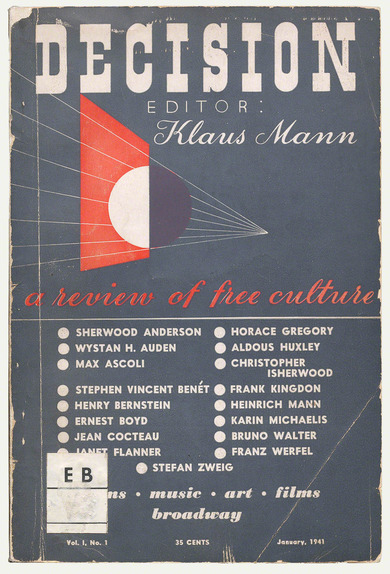
Title:
Decision: A Review of Free Culture
Date of Publication:
Jan. 1941 (1:1) – Jan.-Feb. 1942 (3:1-2)
Place(s) of Publication:
New York, NY
Frequency of Publication:
Monthly
Circulation:
At no time did it exceed 2,000 subscriptions out of 5,000 copies printed.
Publisher:
Decision Inc.; Eunice Clark, President.
Physical Description:
23 cm. Some illustrations. Approx. 70 – 135 pages.
Apr. 1941 introduced regularly monthly columns: Theatre with Ernest Boyd, Dance with Lincoln Kirstein, Art with Christopher Lazare, Music with Leonard Amster, and Film with Erich von Stroheim and Richard R. Plant.
Price:
Unknown
Editor(s):
Klaus Mann
Assistant Editor(s):
Eunice Clark (1:1)
Christopher Lazare (1:2-6, 2:1-3)
Alan Hartman (1:3-6, 2:1-3)
Muriel Rukeyser (2:1-6)
Rebecca Pitts (2:5-6)
Charles Neider (3:1-2)
Libraries with Original Issues:
New York Public Library; University of North Carolina, Chapel Hill; Harvard University; The Museum of Modern Art, New York; Pennsylvania State University; Brown University
Reprint Editions:
Nendeln, Liechtenstein: Kraus Reprint, 1941.
Decision: A Review of Free Culture was founded in January 1941 by Klaus Mann, a German writer who moved to America after being expatriated in 1934. Decision was heavily political and anti-Nazi in focus. Mann hoped the magazine could unite people with democratic ideologies against Nazi Germany, and he preached a “new humanism” that was designed to “transcend all national boundaries” (Decision VI: i: 6).
The seventy- to eighty-page issues circulated monthly and contained numerous critical essays, poetry, stories, paintings, and articles describing “this month in […] books, the theatre, music, movies, and art.” (Decision I:i:5). Many well-known writers contributed to the magazine, including William Carlos Williams, Eudora Welty, and W. H. Auden. Despite their contributions the magazine never gained the necessary popularity to sustain publication. Its audience never grew to more than 2000 subscriptions, and Decision collapsed due to a lack of funds after only one year of publication.
The editors of Decision offered in their inaugural issue an explanation of the magazine’s title and an outline of its goals:
“We call this magazine Decision – not because we have a clean-cut political or intellectual program. This title means rather that we have decided to seek a program, to go on, to meet the challenge of humanity’s retrogression, to overcome the general dismay with the weapons of constructive thinking. This fact that we venture, just now, on the foundation of a literary periodical – of a review of Free Culture – is in itself a gesture of protest and a gesture of hope…[the goal of Decision is] to approach the great problems of modern life, not with the perfunctory curiosity of reporters nor with the routine pathos of politicians, but with the consuming fervor a good philosopher experiences in examining the intricacies of some vitally significant moot question, a good soldier when fighting for the cause he believes in.”
“Issues at Stake.” Decision. 1:1 (Jan 1941): 7.
Klaus Mann (Nov. 18, 1906 – May 21, 1949)
Editor: Jan. 1941 – Feb. 1942
Klaus Mann, a German author and the son of Nobel Prize-winning author Thomas Mann, was the editor for Decision: a Review of Free Culture throughout its entire publication. Mann fled Germany in 1933 in protest of the Nazi regime, was expatriated in 1934, and gained U.S. citizenship in 1938 (Jonas 5-7). He expressed his protest of fascism throughout his literary career, founding two literary journals that combined literature and politics: Die Sammlung, published in 1933 in Amsterdam, and Decision, published from 1941 to 1942 in New York. Consistent with the anti-Nazi themes of Mann’s periodicals, his most well-known novel, Mephisto (1936), was a political satire that attacked Hitler’s impact on Germany (Frisch 2). Mann moved back to Europe to continue supporting harmony among democratic ideologies in 1949, but during that same year he committed suicide by overdosing on sleeping pills (Jonas 10).
Sherwood Anderson
“Girl by the Stove”
“Italian Poet in America”
W.H. Auden
“Poem”
“Symposium: Role of Intellectuals in Political Affairs,” various reviews
Ernest Boyd
“The Art and Mystery of Translation”
“International vs. Cosmopolitan”
“James Joyce: Memories”
“Theatre of the Month”
Aldous Huxley
“Dust”
Carson McCullers
“The Russian Realists and Southern Literature”
“The Twisted Trinity”
Upton Sinclair
“To the Conquered Peoples”
Eudora Welty
“A Visit of Charity”
William Carlos Williams
“Ezra Pound Lord Ga-Ga!”
“The Zoo”
Decision: A Review of Free Culture. 1941 – 1942. Nendeln, Liechtenstein: Kraus Reprints, 1969.
Frisch, Kelly. “Mann, Klaus Heinrich Thomas.” American National Biography Online. Davidson College Library. Oxford University Press, 2000. 10/23/2008.
Gregory, Dan. “June 1941, Cover.” Decision: A Review of Free Culture. Gloucester City, N.J: Between the Covers Rare Books Inc.
Hoffman, Frederick J., Charles Allen, and Carolyn F. Ulrich. The Little Magazine: A History and a Bibliography. Princeton: Princeton University Press, 1947.
Jonas, Ilsedore B. “Klaus Heinrich Mann.” German Fiction Writers, 1914-1945 (Dictionary of Literary Biography Vol 56). Ed. James N. Hardin. Belmont: Thomas Gale, 1987.
Sader, Marion, ed. Comprehensive Index to English-Language Little Magazines, 1890-1970: Series One. Millwood, KY: Kraus-Thomson, 1976.
Sherbo, Arthur. “Periodical Grubbings.” Notes and Queries. v41 no3 (Sept. 1994), 266. Literature Resource Center. Web. 10/23/2008.
Shteir, Rachel. “Everybody Slept Here.” New York Times. Nov. 10, 1996. ProQuest Historical Newspapers. Davidson College Library Online. The New York Times (1851-2005). BR71.
“Decision” compiled by Ian Qua (Class of ’09, Davidson College)